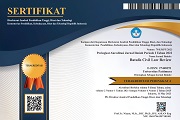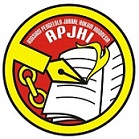The Obligation of Adopted Children to Fulfill Parents' Alimentary Rights
 ), Roy Prabowo Lenggono(3)
), Roy Prabowo Lenggono(3)
(1) Faculty of Law, Universitas Pattimura, Ambon, Indonesia
(2) Faculty of Law, Universitas Pattimura, Ambon, Indonesia
(3) Faculty of Law, Universitas Pattimura, Ambon, Indonesia
 Corresponding Author
Corresponding Author
Abstract
Introduction: Child adoptions have been carried out in different ways and motivations, in accordance with the current legal system and regulations in society. Parents who adopt a child will assume the obligation to raise the adopted child like a biological child. However, the question of the responsibility of the adopted child for the fulfillment of the alimony rights of his or her adoptive parents has also become a legal study and social practice.
Purposes of the Research: This research aims to analyze the obligations of adopted children to fulfill their parents' allimentary rights.
Methods of the Research: The type of research used is sociolegal research, which is a combination research method between doctrinal legal research methods and empirical legal research methods.
Results Main Findings of the Research: Adopted children have clear legal obligations to the adoptive parents in terms of the fulfillment of allimentary rights. In addition, there is a need for clarity to strengthen regulations regarding the rights and obligations of adopted children in the Civil Code in Indonesia. This is important to provide legal certainty for all parties and increase public awareness of the rights and obligations carried by adopted children.Keywords
DOI
10.47268/ballrev.v6i1.2815
Published
2025-03-31
How To Cite
@article{BALLREV2815,
author = {Merry Tjoanda and Wijaya Natalia Panjaitan and Roy Prabowo Lenggono},
title = {The Obligation of Adopted Children to Fulfill Parents' Alimentary Rights},
journal = {Batulis Civil Law Review},
volume = {6},
number = {1},
year = {2025},
keywords = {Obligation; Adopted Children; Parents’ Alimentary Rights.},
abstract = {Introduction: Child adoptions have been carried out in different ways and motivations, in accordance with the current legal system and regulations in society. Parents who adopt a child will assume the obligation to raise the adopted child like a biological child. However, the question of the responsibility of the adopted child for the fulfillment of the alimony rights of his or her adoptive parents has also become a legal study and social practice.Purposes of the Research: This research aims to analyze the obligations of adopted children to fulfill their parents' allimentary rights.Methods of the Research: The type of research used is sociolegal research, which is a combination research method between doctrinal legal research methods and empirical legal research methods.Results Main Findings of the Research: Adopted children have clear legal obligations to the adoptive parents in terms of the fulfillment of allimentary rights. In addition, there is a need for clarity to strengthen regulations regarding the rights and obligations of adopted children in the Civil Code in Indonesia. This is important to provide legal certainty for all parties and increase public awareness of the rights and obligations carried by adopted children.},
issn = {2746-8151}, pages = {44--53} doi = {10.47268/ballrev.v6i1.2815},
url = {https://fhukum.unpatti.ac.id/jurnal/ballrev/article/view/2815}
}
Aisyah, Nur. “Anak Angkat Dalam Hukum Kewarisan Islam Dan Hukum Perdata.” El-Iqthisady: Jurnal Hukum Ekonomi Syariah 2, no. 1 (2020): 101–13. https://doi.org/10.24252/el-iqthisadi.v2i1.14137.
Anggriawan, Teddy Prima. “Hukum Pengangkatan Anak Melalui Akta Pengakuan Pengangkatan Anak Yang Dibuat Oleh Notaris.” Widya Pranata Hukum: Jurnal Kajian Dan Penelitian Hukum 3, no. 1 (2021): 1–14. https://doi.org/10.37631/widyapranata.v3i1.272.
Angkat, Lusi Aryani. “Tinjaun Hukum Tentang Kewajiban Alimentasi Antara Anak Kandung Dengan Orang Tua Menurut Hukum Islam.” Jurnal Ilmiah Mahasiswa Hukum [JIMHUM] 2, no. 3 (2022): 1–10. http://jurnalmahasiswa.umsu.ac.id/index.php/jimhum/article/view/1617.
Detikcom. “Saya Anak Angkat, Apakah Juga Masih Dapat Waris Dari Ortu Kandung?” https://news.detik.com/, 2022. https://news.detik.com/berita/d-6168377/saya-anak-angkat-apakah-juga-masih-dapat-waris-dari-ortu-kandung.
Ernawati. “Kewajiban Anak Memberi Nafkah Kepada Orang Tua Menurut Hukum Islam.” Forum Ilmiah 12, no. 1 (2015): 16–22.
Fathanah, Rahdinal, and Rachmi Sulistyarini. “Tanggung Jawab Anak Dalam Memelihara Orang Tua Terkait Ketentuan Pasal 46 Ayat (2) Undang-Undang Nomor 1 Tahun 1974 Tentang Perkawinan.” Jurnal Ilmiah Pendidikan Pancasila Dan Kewarganegaraan 5, no. 2 (2020): 226–32. https://doi.org/10.17977/um019v5i2p226-232.
Ghifari, Angga Aidry, and I Gede Yusa. “Pengaturan Pengangkatan Anak (Adopsi) Berdasarkan Peraturan Perundangan-Undangan Di Indonesia.” Kertha Negara (Journal Ilmu Hukum) 8, no. 2 (2020): 1–13.
Hadikusuma, Hilman. Hukum Perkawinan Indonesia Menurut: Perundangan, Hukum Adat, Hukum Agama. Bandung: Mandar Maju, 2007.
Irianto, Sulistyowati, and Shidarta. Metode Penelitian Hukum: Konstelasi Dan Refleksi. Jakarta: Yayasan Obor Indonesia, 2011.
Komalawati, Veronica, Sridewi Anggraeni, and Alma Ardelia Ma’arif. “Kewajiban Alimentasi Anak Kepada Orang Tua Yang Berada Di Panti Sosial Merupakan Hubungan Hukum Akibat Perkawinan Dan Hubungan Darah.” Jurnal Sains Sosio Humaniora 5, no. 2 (2021): 1311–23.
Nurhardanti, Nadia. “Hak Alimentasi Bagi Orang Tua Lanjut Usia Terlantar (Studi Kasus Di Panti Werdha Majapahit Kecamatan Sooko Kabupaten Mojokerto).” Jurnal Ilmu Hukum, Universitas Brawijaya Malang, 2015, 1–16. https://repository.ub.ac.id/id/eprint/112156/.
Rais, Muhammad. “Kedudukan Anak Angkat Dalam Perspektif Hukum Islam, Hukum Adat Dan Hukum Perdata.” Jurnal Hukum Diktum 14, no. 2 (2016): 183–200. https://doi.org/10.35905/diktum.v14i2.232.
Sari, Melia Putri Purnama, Veronica Komalawati, and Kilkoda Agus Saleh. “Tanggung Jawab Alimentasi Anak Yang Sudah Dewasa Terhadap Orang Tua Lansia.” Jurnal Ius Constituendum 7, no. 2 (2022): 293–306. https://doi.org/10.26623/jic.v7i2.5342.
Satrio, J. Hukum Pribadi. Bagian I P. Bandung: Citra Aditya Bakti, 1999.
Soimin, Soedharyo. Hukum Orang Dan Keluarga. Jakarta: Jakarta: Sinar Grafika, 2009.
Waspiah, Waspiah, Rodiyah, Dian Latifiani, Ridwan Arifin, Kartika Fajar Cahyani, Adinda Ratna Pertiwi, Anita Indah Widiastuti, and Adelia Setya Ayu. “Peningkatan Pemahaman Hak Alimentasi Terhadap Kelompok Lanjut Usia Melalui Legal Counseling Approach.” Jurnal Pengabdian Hukum Indonesia (Indonesian Journal Of Legal Community Engagement) 4, no. 1 (2021): 112–22. https://doi.org/10.15294/jphi.v4i1.47827.| Dublin Core | PKP Metadata Items | Metadata for this Document | |
| 1. | Title | Title of document | The Obligation of Adopted Children to Fulfill Parents' Alimentary Rights |
| 2. | Creator | Author's name, affiliation, country | Merry Tjoanda; Faculty of Law, Universitas Pattimura, Ambon; Indonesia |
| 2. | Creator | Author's name, affiliation, country | Wijaya Natalia Panjaitan; Faculty of Law, Universitas Pattimura, Ambon; Indonesia |
| 2. | Creator | Author's name, affiliation, country | Roy Prabowo Lenggono; Faculty of Law, Universitas Pattimura, Ambon; Indonesia |
| 3. | Subject | Discipline(s) | |
| 3. | Subject | Keyword(s) | Obligation; Adopted Children; Parents’ Alimentary Rights. |
| 4. | Description | Abstract | Introduction: Child adoptions have been carried out in different ways and motivations, in accordance with the current legal system and regulations in society. Parents who adopt a child will assume the obligation to raise the adopted child like a biological child. However, the question of the responsibility of the adopted child for the fulfillment of the alimony rights of his or her adoptive parents has also become a legal study and social practice.Purposes of the Research: This research aims to analyze the obligations of adopted children to fulfill their parents' allimentary rights.Methods of the Research: The type of research used is sociolegal research, which is a combination research method between doctrinal legal research methods and empirical legal research methods.Results Main Findings of the Research: Adopted children have clear legal obligations to the adoptive parents in terms of the fulfillment of allimentary rights. In addition, there is a need for clarity to strengthen regulations regarding the rights and obligations of adopted children in the Civil Code in Indonesia. This is important to provide legal certainty for all parties and increase public awareness of the rights and obligations carried by adopted children. |
| 5. | Publisher | Organizing agency, location | Faculty of Law, Universitas Pattimura |
| 6. | Contributor | Sponsor(s) | |
| 7. | Date | (YYYY-MM-DD) | 2025-03-31 |
| 8. | Type | Status & genre | Peer-reviewed Article |
| 8. | Type | Type | |
| 9. | Format | File format | |
| 10. | Identifier | Uniform Resource Identifier | https://fhukum.unpatti.ac.id/jurnal/ballrev/article/view/2815 |
| 10. | Identifier | Digital Object Identifier | 10.47268/ballrev.v6i1.2815 |
| 11. | Source | Title; vol., no. (year) | Batulis Civil Law Review; Vol 6, No 1 (2025): VOLUME 6 ISSUE 1, MARCH 2025 |
| 12. | Language | English=en | en |
| 13. | Relation | Supp. Files | |
| 14. | Coverage | Geo-spatial location, chronological period, research sample (gender, age, etc.) | |
| 15. | Rights | Copyright and permissions | Copyright: Authors who publish their manuscripts in this Journal agree to the following conditions: 1. The copyright in each article belongs to the author, as well as the right to patent. 2. Authors are able to enter into separate, additional contractual arrangements for the non-exclusive distribution of the journal's published version of the work (e.g., post it to an institutional repository or publish it in a book), with an acknowledgment of its initial publication in this journal. 3. Authors are permitted and encouraged to post their work online (e.g., in institutional repositories or on their website) prior to and during the submission process, as it can lead to productive exchanges, as well as earlier and greater citation of published work. 4. Authors have the right to self-archiving of the article (Author Self-Archiving Policy)
Licence : Batulis Civil Law Review Journal is disseminated based on the Creative Commons Attribution-NonCommercial 4.0 International license terms. This license allows anyone to copy and redistribute this material in any form or format, compose, modify, and make derivatives of this material for any purpose. You cannot use this material for commercial purposes. You must specify an appropriate name, include a link to the license, and certify that any changes have been made. You can do this in a way that is appropriate, but does not imply that the licensor supports you or your use.
|
Copyright (c) 2025 Merry Tjoanda, Wijaya Natalia Panjaitan, Roy Prabowo Lenggono

This work is licensed under a Creative Commons Attribution-NonCommercial 4.0 International License.

 : 1578 times
: 1578 times Download : 1372 times
Download : 1372 times














